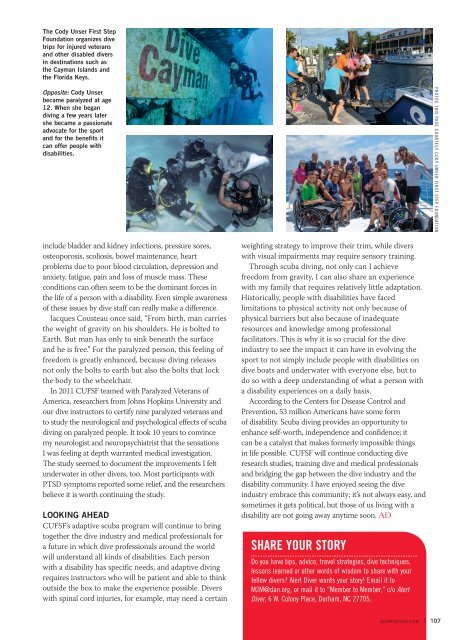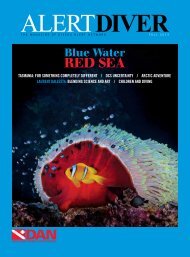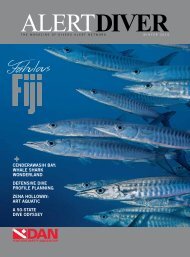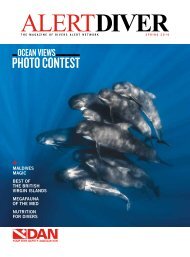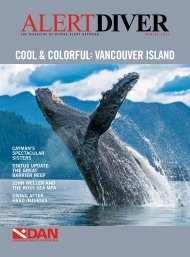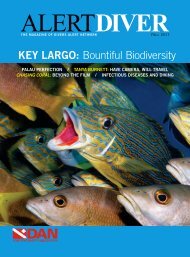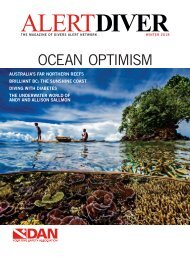AD 2016 Q3
Alert Diver is the dive industry’s leading publication. Featuring DAN’s core content of dive safety, research, education and medical information, each issue is a must-read reference, archived and shared by passionate scuba enthusiasts. In addition, Alert Diver showcases fascinating dive destinations and marine environmental topics through images from the world’s greatest underwater photographers and stories from the most experienced and eloquent dive journalists in the business.
Alert Diver is the dive industry’s leading publication. Featuring DAN’s core content of dive safety, research, education and medical information, each issue is a must-read reference, archived and shared by passionate scuba enthusiasts. In addition, Alert Diver showcases fascinating dive destinations and marine environmental topics through images from the world’s greatest underwater photographers and stories from the most experienced and eloquent dive journalists in the business.
You also want an ePaper? Increase the reach of your titles
YUMPU automatically turns print PDFs into web optimized ePapers that Google loves.
The Cody Unser First Step<br />
Foundation organizes dive<br />
trips for injured veterans<br />
and other disabled divers<br />
in destinations such as<br />
the Cayman Islands and<br />
the Florida Keys.<br />
Opposite: Cody Unser<br />
became paralyzed at age<br />
12. When she began<br />
diving a few years later<br />
she became a passionate<br />
advocate for the sport<br />
and for the benefits it<br />
can offer people with<br />
disabilities.<br />
PHOTOS THIS PAGE COURTESY CODY UNSER FIRST STEP FOUNDATION<br />
include bladder and kidney infections, pressure sores,<br />
osteoporosis, scoliosis, bowel maintenance, heart<br />
problems due to poor blood circulation, depression and<br />
anxiety, fatigue, pain and loss of muscle mass. These<br />
conditions can often seem to be the dominant forces in<br />
the life of a person with a disability. Even simple awareness<br />
of these issues by dive staff can really make a difference.<br />
Jacques Cousteau once said, “From birth, man carries<br />
the weight of gravity on his shoulders. He is bolted to<br />
Earth. But man has only to sink beneath the surface<br />
and he is free.” For the paralyzed person, this feeling of<br />
freedom is greatly enhanced, because diving releases<br />
not only the bolts to earth but also the bolts that lock<br />
the body to the wheelchair.<br />
In 2011 CUFSF teamed with Paralyzed Veterans of<br />
America, researchers from Johns Hopkins University and<br />
our dive instructors to certify nine paralyzed veterans and<br />
to study the neurological and psychological effects of scuba<br />
diving on paralyzed people. It took 10 years to convince<br />
my neurologist and neuropsychiatrist that the sensations<br />
I was feeling at depth warranted medical investigation.<br />
The study seemed to document the improvements I felt<br />
underwater in other divers, too. Most participants with<br />
PTSD symptoms reported some relief, and the researchers<br />
believe it is worth continuing the study.<br />
LOOKING AHE<strong>AD</strong><br />
CUFSF’s adaptive scuba program will continue to bring<br />
together the dive industry and medical professionals for<br />
a future in which dive professionals around the world<br />
will understand all kinds of disabilities. Each person<br />
with a disability has specific needs, and adaptive diving<br />
requires instructors who will be patient and able to think<br />
outside the box to make the experience possible. Divers<br />
with spinal cord injuries, for example, may need a certain<br />
weighting strategy to improve their trim, while divers<br />
with visual impairments may require sensory training.<br />
Through scuba diving, not only can I achieve<br />
freedom from gravity, I can also share an experience<br />
with my family that requires relatively little adaptation.<br />
Historically, people with disabilities have faced<br />
limitations to physical activity not only because of<br />
physical barriers but also because of inadequate<br />
resources and knowledge among professional<br />
facilitators. This is why it is so crucial for the dive<br />
industry to see the impact it can have in evolving the<br />
sport to not simply include people with disabilities on<br />
dive boats and underwater with everyone else, but to<br />
do so with a deep understanding of what a person with<br />
a disability experiences on a daily basis.<br />
According to the Centers for Disease Control and<br />
Prevention, 53 million Americans have some form<br />
of disability. Scuba diving provides an opportunity to<br />
enhance self-worth, independence and confidence; it<br />
can be a catalyst that makes formerly impossible things<br />
in life possible. CUFSF will continue conducting dive<br />
research studies, training dive and medical professionals<br />
and bridging the gap between the dive industry and the<br />
disability community. I have enjoyed seeing the dive<br />
industry embrace this community; it’s not always easy, and<br />
sometimes it gets political, but those of us living with a<br />
disability are not going away anytime soon. <strong>AD</strong><br />
SHARE YOUR STORY<br />
Do you have tips, advice, travel strategies, dive techniques,<br />
lessons learned or other words of wisdom to share with your<br />
fellow divers? Alert Diver wants your story! Email it to<br />
M2M@dan.org, or mail it to “Member to Member,” c/o Alert<br />
Diver, 6 W. Colony Place, Durham, NC 27705.<br />
ALERTDIVER.COM | 107


